2024 Year in Review by Dairynews.today: Event, Person, and Company of the Year
The year 2024 reinforced the trends of recent years in the global market. Events over the past year highlighted the resilience of key players in the dairy industry, a strengthening trend toward specialization, industry consolidation, pressures from environmental groups and major investors, and a continuing dependency on the global geopolitical climate.
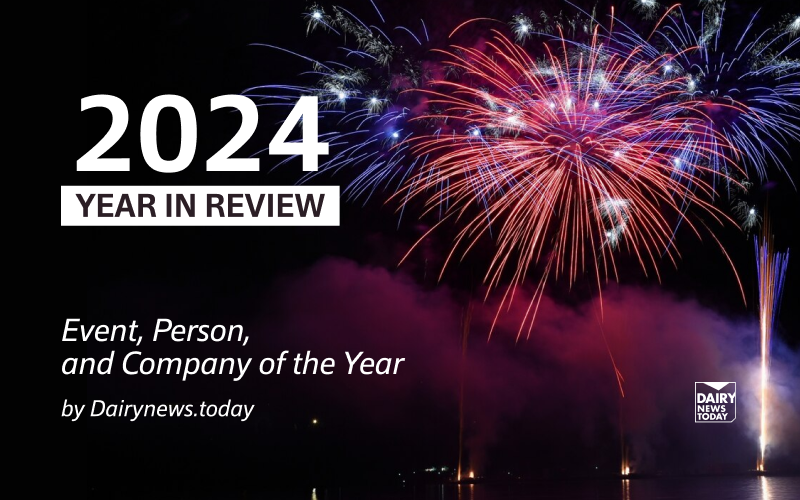
The dairy industry remains one of the most socially significant industrial sectors, employing over 1 billion people worldwide. As the largest independent media outlet in the dairy sector, Dairynews.today concludes the year with several key nominations.
Event of the Year: Donald Trump’s Second Presidential Term
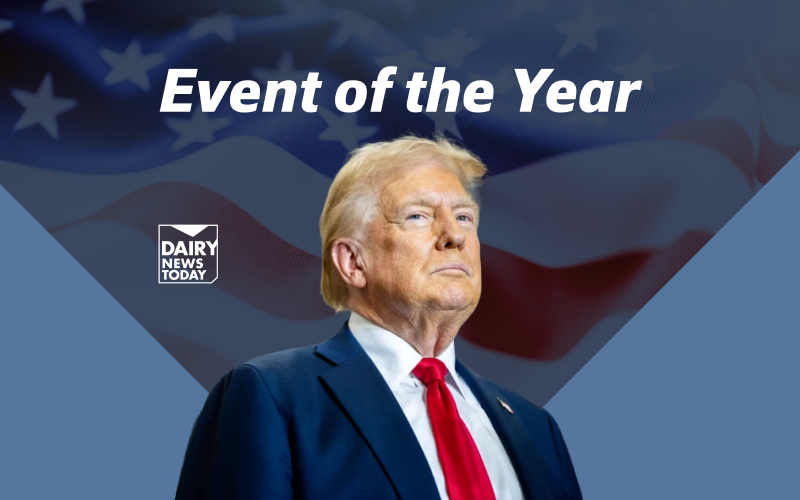
The November 5 U.S. elections culminated in a decisive victory for Donald Trump. Even before the results, many industry representatives and neighboring countries expressed concerns about the potential global impact of his election. For instance, Canadian officials frequently referenced Trump’s "America First" program, which they fear could reignite contentious trade issues. During his campaign, Trump proposed a 60% tariff on Chinese goods and a 10% tariff on imports fr om other countries to protect U.S. industries. Economists warn that retaliatory tariffs on U.S. agricultural products could harm the country’s strong agricultural export markets.
Although Trump’s trade policies primarily target China, smaller trade partners like New Zealand could face collateral damage. The U.S. is New Zealand’s largest market for beef and wine and the second-largest for lamb, with total exports to the U.S. in 2022 amounting to $8.8 billion, including $2.2 billion in beef, $1.2 billion in lamb, $800 million in wine, and $1.2 billion in dairy products.
Concerns also extend to Trump’s immigration policies. While many acknowledge the U.S. immigration crisis, the lack of immigrant labor often translates to a workforce shortage and increased costs for farmers, particularly small-scale family dairy farms in states like Wisconsin. With over 6,000 family dairy farms, Wisconsin is already grappling with industry consolidation and competition fr om corporate farms. Immigrant workers are vital to sustaining small and mid-sized businesses, and their absence could lead to widespread bankruptcies.
A recent Rabobank report predicts inflation, increased federal deficits, and disruptions in agricultural trade if Trump implements his proposed economic policies. However, deregulation efforts might lower costs in the food and agricultural sectors, improving efficiency. Increased domestic fossil fuel production could reduce energy costs, though OPEC’s influence may lim it the impact. Additionally, lower grain prices driven by policy changes could benefit livestock and dairy producers through reduced feed costs.
On December 23, President-elect Trump announced Brooke Rollins, former policy advisor and current CEO of the America First Policy Institute, as his nominee for Agriculture Secretary. Industry associations have expressed support for this nomination and Trump’s emphasis on boosting domestic production.
Trend of the Year: Shedding the Excess, Focusing on Profitability
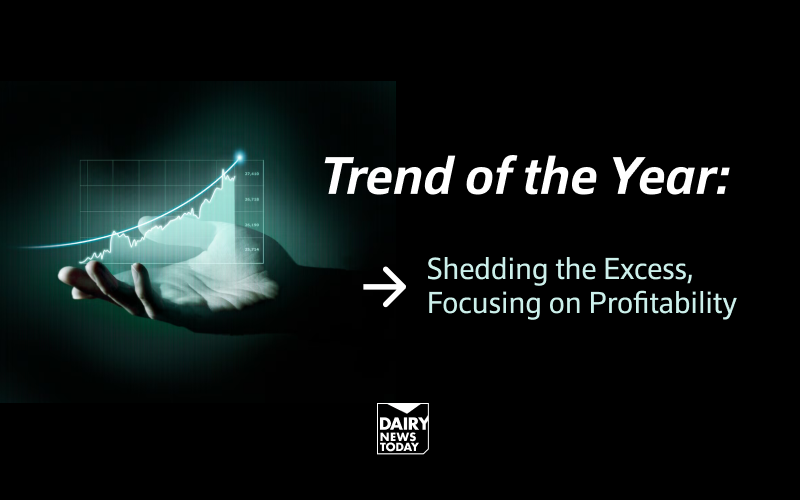
The most prominent manifestation of this trend was the announcement by New Zealand’s fonterra-plans-to-sell-consumer-brands-division-market-expectations-and-forecasts-.html?sphrase_id=19902058">Fonterra in May 2024 of its intention to divest its consumer goods division and focus on value-added products, commodities, and the HoReCa sector. In November, Fonterra Co-operative Group Ltd provided an upd ate on its exploration of potential options for selling its global consumer business, as well as its integrated operations in Fonterra Oceania and Fonterra Sri Lanka. The options currently under consideration include a commercial sale or an IPO.
Other industry giants like Kerry and Danone are also narrowing their focus.
A Key Player in the Dairy and Agri-Business Sector
The Irish company Kerry Dairy processes over 1.1 billion liters of milk annually from 2,740 family farms across Munster. It operates seven production facilities in Ireland and the UK, producing popular consumer brands such as Cheesstrings, EasiSingles, LowLow, Dairygold, and Charleville.
Kerry Group plc entered a historic agreement to sell Kerry Dairy Holdings (Ireland) Limited to Kerry Co-Operative Creameries Limited for a proposed consideration of €500 million. The deal involves an initial transfer of 70% of shares to the cooperative, while Kerry Group retains 30%. The remaining shares are expected to be transferred to the cooperative by 2032. Meanwhile, Kerry Group intends to focus on developing flavor solutions and ready-to-eat food products.
Danone’s Focus and Growth
In October 2024, Danone reported third-quarter sales of €6.826 billion, marking a 4.2% year-over-year increase (LFL).
The company observed another quarter of robust competitive growth in China, North Asia, and Oceania, leading in all categories. Danone reaffirmed its 2024 outlook, anticipating comparable sales growth of 3% to 5% with a moderate increase in the current operating margin. The company announced a new strategy centered on specific food categories: High Protein, Coffee Creations, and Medical Nutrition.
Danone experienced especially strong growth in China, Japan, Australia, and New Zealand, wh ere comparable sales increased by more than 8% despite price reductions. High demand for yogurt in Japan, the recovery of vitamin drink Mizone sales in China, and growth in medical nutrition products contributed to this regional success.
The specialized nutrition segment, including products for oncology patients, was Danone’s fastest-growing division. This business is se t to play a pivotal role in the company’s recovery under CEO Antoine de Saint-Affrique, who is leveraging an aging global population and driving growth through strategic mergers and acquisitions.
Person of the Year: Antoine de Saint-Affrique, Chief Executive Officer of Danone
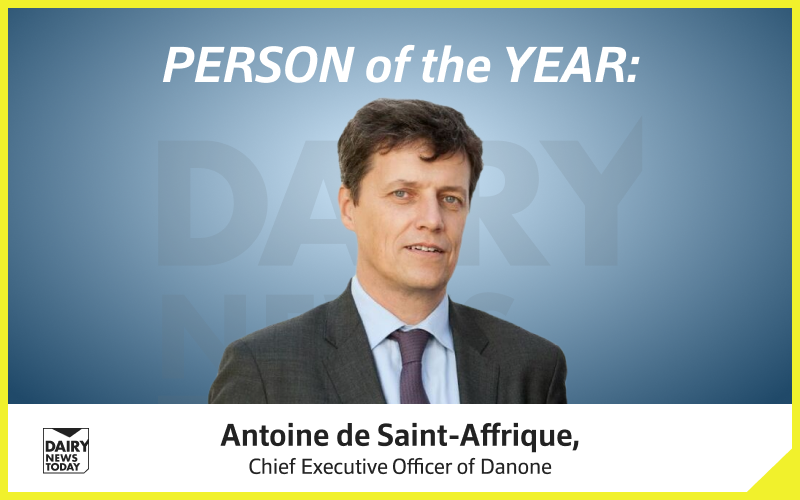
Reflecting on the third quarter of 2024, Antoine de Saint-Affrique highlighted the company’s performance:
"With comparable sales growth of +4.2% in Q3, driven by a +3.6% increase in volume across our portfolio, we continue to demonstrate significant quality growth. Both sales volumes and price ratios remain positive across all categories."
"Our consistent focus on science-backed innovations tailored to consumers and patients, combined with operational market efficiency, continues to deliver results. This is evident in the sustained high performance of our winning platforms, such as High Protein, Coffee Creations, and Medical Nutrition. We have also enhanced the competitiveness of our core portfolio across many geographic regions."
Despite ongoing challenges, de Saint-Affrique expressed confidence in the future, emphasizing the strengthened foundational principles achieved through Danone's strategic renewal.
Danone successfully navigated difficult situations throughout the year. The company exited Russia under complex circumstances, with its local business first transferring to government oversight and later to specific private entities. Despite these challenges, Danone restructured its strategy to focus on high-demand areas, achieving the best profitability results among its industry competitors.
Under de Saint-Affrique’s leadership, Danone has embarked on its upd ated 2025–2028 strategy, built on three fundamental pillars:
This strategic direction underscores Danone’s commitment to innovation and its aspiration to lead in health-focused food solutions.
Failure of the Year: Arla and DSM in the UK
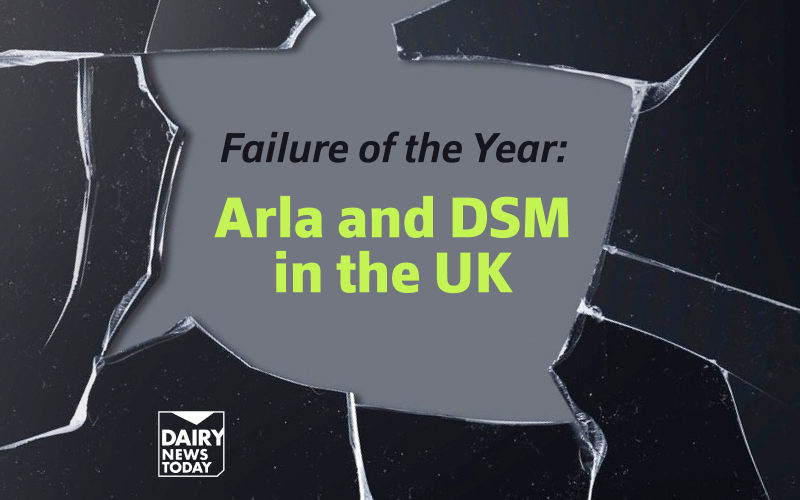
In late November, Arla announced the start of trials for Bovaer, a feed additive developed by DSM to reduce methane emissions fr om livestock.
Wh ere did things go wrong? Within a week of the announcement, more than 14,000 consumers took to X (formerly Twitter) to pour Arla milk down the drain, claiming that interfering with a cow's metabolism was dangerous and that the milk produced would be toxic.
The feed additive works by inhibiting an enzyme responsible for methane synthesis in the cow’s rumen and is fully metabolized within the animal, meaning no traces can enter the milk or meat. The active ingredient is synthesized 3-nitrooxypropanol, and it also contains propylene glycol (as a diluent) and dried silica acid (as a carrier). DSM has touted Bovaer as "the most well-researched and scientifically supported solution" among similar products, with over 150 studies conducted on its efficacy.
However, shortly after the announcement, public backlash erupted. A wide range of stakeholders, from ordinary consumers to members of parliament, declared they would not consume anything potentially containing Bovaer.
Consumer Protests and Retailer Boycotts
The protests also extended to retailers, with major supermarket chains that had partnered with Arla in environmental alliances facing backlash. Social media posts calling for boycotts of Tesco, Morrisons, and Aldi gained significant traction. Some of these calls went viral on platforms like TikTok, urging others to join the boycott. Videos of people pouring out Arla milk became a viral sensation, further fueling the public outcry.
In response, Arla and DSM-Firmenich issued statements refuting numerous conspiracy theories, which even implicated prominent figures like Bill Gates as stakeholders in the additive's development. Despite these efforts, consumer skepticism persisted.
Lessons from the Fallout
Experts continue to debate the reasons behind such a strong reaction to Bovaer. At the heart of the issue seems to be a psychological mistrust of corporate environmental claims and a broader resistance to anything perceived as disrupting the "natural order of things."
What can be said with certainty is that both companies fell short in terms of customer development (custdev) and crafting a robust communication strategy. This failure to effectively engage with and educate the public ultimately derailed what might have been a breakthrough in sustainable livestock farming.
Company of the Year: Yili
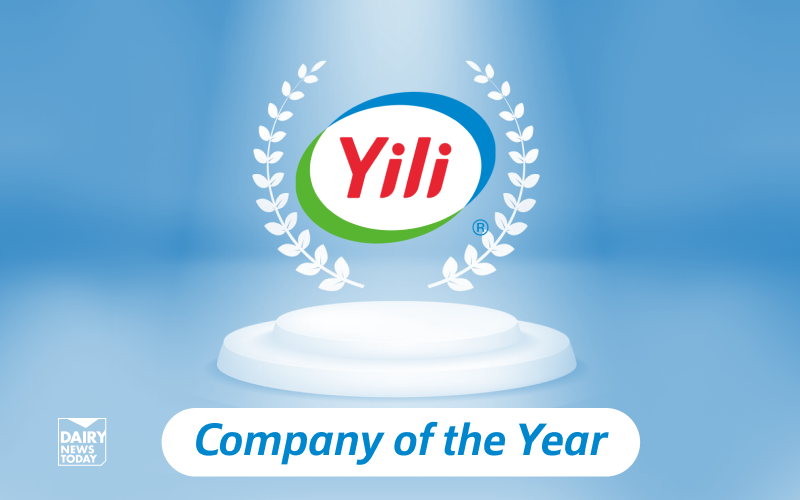
While the French giant Danone pivots toward becoming a science-driven company, China’s Yili has clearly solidified its position on this path in 2024.
Dairynews.today names Yili as the Company of the Year for 2024.
Driving Innovation and Global Expansion
At the start of the year, Yili began modernizing the European branch of the National Center for Technological Innovation in the Dairy Industry. At the same time, Ambpomial Active Probiotic Yogurt by Yili was showcased at the European Microbiome and Probiotics Forum. Each bottle of Ambpomial yogurt incorporates 1 billion CFU of the globally renowned probiotic strain Lactobacillus rhamnosus GG. The yogurt is also heat-resistant, catering to Chinese preferences for warm food.
Read more.
Record Financial Performance
On April 29, Yili Group announced its 2023 financial results, reporting a record operating revenue of ¥126.179 billion and a net profit of ¥10.429 billion attributable to the parent company. This achievement extends Yili’s streak of 31 consecutive years of growth, with overseas business revenues increasing by more than 10%.
Support for Innovation and Education
Yili’s innovation centers actively supported students and young scientists throughout the year. The company participated in numerous events focused on healthy nutrition and innovation in human health products.
Yili Health Valley: A Visionary Project
In China, Yili is developing the Yili Health Valley, a vast science-centered city with complete living infrastructure. This project aligns with Yili’s “Smart Intelligence” strategy, aimed at the intelligent development of the dairy industry.
The World’s Most Valuable Dairy Brand
Yili remains the world’s most valuable dairy brand for the fifth consecutive year, with a valuation of $11.6 billion, according to the latest Brand Finance report. Despite challenges facing the global dairy industry, Yili’s focus on innovation and digital transformation has reinforced its market leadership.
Through its commitment to innovation, sustainability, and strategic growth, Yili continues to se t benchmarks for the global dairy industry.
Event of the Year: Donald Trump’s Second Presidential Term

The November 5 U.S. elections culminated in a decisive victory for Donald Trump. Even before the results, many industry representatives and neighboring countries expressed concerns about the potential global impact of his election. For instance, Canadian officials frequently referenced Trump’s "America First" program, which they fear could reignite contentious trade issues. During his campaign, Trump proposed a 60% tariff on Chinese goods and a 10% tariff on imports fr om other countries to protect U.S. industries. Economists warn that retaliatory tariffs on U.S. agricultural products could harm the country’s strong agricultural export markets.
Although Trump’s trade policies primarily target China, smaller trade partners like New Zealand could face collateral damage. The U.S. is New Zealand’s largest market for beef and wine and the second-largest for lamb, with total exports to the U.S. in 2022 amounting to $8.8 billion, including $2.2 billion in beef, $1.2 billion in lamb, $800 million in wine, and $1.2 billion in dairy products.
Concerns also extend to Trump’s immigration policies. While many acknowledge the U.S. immigration crisis, the lack of immigrant labor often translates to a workforce shortage and increased costs for farmers, particularly small-scale family dairy farms in states like Wisconsin. With over 6,000 family dairy farms, Wisconsin is already grappling with industry consolidation and competition fr om corporate farms. Immigrant workers are vital to sustaining small and mid-sized businesses, and their absence could lead to widespread bankruptcies.
A recent Rabobank report predicts inflation, increased federal deficits, and disruptions in agricultural trade if Trump implements his proposed economic policies. However, deregulation efforts might lower costs in the food and agricultural sectors, improving efficiency. Increased domestic fossil fuel production could reduce energy costs, though OPEC’s influence may lim it the impact. Additionally, lower grain prices driven by policy changes could benefit livestock and dairy producers through reduced feed costs.
On December 23, President-elect Trump announced Brooke Rollins, former policy advisor and current CEO of the America First Policy Institute, as his nominee for Agriculture Secretary. Industry associations have expressed support for this nomination and Trump’s emphasis on boosting domestic production.
Trend of the Year: Shedding the Excess, Focusing on Profitability

The most prominent manifestation of this trend was the announcement by New Zealand’s fonterra-plans-to-sell-consumer-brands-division-market-expectations-and-forecasts-.html?sphrase_id=19902058">Fonterra in May 2024 of its intention to divest its consumer goods division and focus on value-added products, commodities, and the HoReCa sector. In November, Fonterra Co-operative Group Ltd provided an upd ate on its exploration of potential options for selling its global consumer business, as well as its integrated operations in Fonterra Oceania and Fonterra Sri Lanka. The options currently under consideration include a commercial sale or an IPO.
Other industry giants like Kerry and Danone are also narrowing their focus.
A Key Player in the Dairy and Agri-Business Sector
The Irish company Kerry Dairy processes over 1.1 billion liters of milk annually from 2,740 family farms across Munster. It operates seven production facilities in Ireland and the UK, producing popular consumer brands such as Cheesstrings, EasiSingles, LowLow, Dairygold, and Charleville.
Kerry Group plc entered a historic agreement to sell Kerry Dairy Holdings (Ireland) Limited to Kerry Co-Operative Creameries Limited for a proposed consideration of €500 million. The deal involves an initial transfer of 70% of shares to the cooperative, while Kerry Group retains 30%. The remaining shares are expected to be transferred to the cooperative by 2032. Meanwhile, Kerry Group intends to focus on developing flavor solutions and ready-to-eat food products.
Danone’s Focus and Growth
In October 2024, Danone reported third-quarter sales of €6.826 billion, marking a 4.2% year-over-year increase (LFL).
The company observed another quarter of robust competitive growth in China, North Asia, and Oceania, leading in all categories. Danone reaffirmed its 2024 outlook, anticipating comparable sales growth of 3% to 5% with a moderate increase in the current operating margin. The company announced a new strategy centered on specific food categories: High Protein, Coffee Creations, and Medical Nutrition.
Danone experienced especially strong growth in China, Japan, Australia, and New Zealand, wh ere comparable sales increased by more than 8% despite price reductions. High demand for yogurt in Japan, the recovery of vitamin drink Mizone sales in China, and growth in medical nutrition products contributed to this regional success.
The specialized nutrition segment, including products for oncology patients, was Danone’s fastest-growing division. This business is se t to play a pivotal role in the company’s recovery under CEO Antoine de Saint-Affrique, who is leveraging an aging global population and driving growth through strategic mergers and acquisitions.
Person of the Year: Antoine de Saint-Affrique, Chief Executive Officer of Danone

Reflecting on the third quarter of 2024, Antoine de Saint-Affrique highlighted the company’s performance:
"With comparable sales growth of +4.2% in Q3, driven by a +3.6% increase in volume across our portfolio, we continue to demonstrate significant quality growth. Both sales volumes and price ratios remain positive across all categories."
"Our consistent focus on science-backed innovations tailored to consumers and patients, combined with operational market efficiency, continues to deliver results. This is evident in the sustained high performance of our winning platforms, such as High Protein, Coffee Creations, and Medical Nutrition. We have also enhanced the competitiveness of our core portfolio across many geographic regions."
Despite ongoing challenges, de Saint-Affrique expressed confidence in the future, emphasizing the strengthened foundational principles achieved through Danone's strategic renewal.
Danone successfully navigated difficult situations throughout the year. The company exited Russia under complex circumstances, with its local business first transferring to government oversight and later to specific private entities. Despite these challenges, Danone restructured its strategy to focus on high-demand areas, achieving the best profitability results among its industry competitors.
Under de Saint-Affrique’s leadership, Danone has embarked on its upd ated 2025–2028 strategy, built on three fundamental pillars:
- Science and innovation
- Operational discipline
- Active portfolio management
This strategic direction underscores Danone’s commitment to innovation and its aspiration to lead in health-focused food solutions.
Failure of the Year: Arla and DSM in the UK

In late November, Arla announced the start of trials for Bovaer, a feed additive developed by DSM to reduce methane emissions fr om livestock.
Wh ere did things go wrong? Within a week of the announcement, more than 14,000 consumers took to X (formerly Twitter) to pour Arla milk down the drain, claiming that interfering with a cow's metabolism was dangerous and that the milk produced would be toxic.
The feed additive works by inhibiting an enzyme responsible for methane synthesis in the cow’s rumen and is fully metabolized within the animal, meaning no traces can enter the milk or meat. The active ingredient is synthesized 3-nitrooxypropanol, and it also contains propylene glycol (as a diluent) and dried silica acid (as a carrier). DSM has touted Bovaer as "the most well-researched and scientifically supported solution" among similar products, with over 150 studies conducted on its efficacy.
However, shortly after the announcement, public backlash erupted. A wide range of stakeholders, from ordinary consumers to members of parliament, declared they would not consume anything potentially containing Bovaer.
Consumer Protests and Retailer Boycotts
The protests also extended to retailers, with major supermarket chains that had partnered with Arla in environmental alliances facing backlash. Social media posts calling for boycotts of Tesco, Morrisons, and Aldi gained significant traction. Some of these calls went viral on platforms like TikTok, urging others to join the boycott. Videos of people pouring out Arla milk became a viral sensation, further fueling the public outcry.
In response, Arla and DSM-Firmenich issued statements refuting numerous conspiracy theories, which even implicated prominent figures like Bill Gates as stakeholders in the additive's development. Despite these efforts, consumer skepticism persisted.
Lessons from the Fallout
Experts continue to debate the reasons behind such a strong reaction to Bovaer. At the heart of the issue seems to be a psychological mistrust of corporate environmental claims and a broader resistance to anything perceived as disrupting the "natural order of things."
What can be said with certainty is that both companies fell short in terms of customer development (custdev) and crafting a robust communication strategy. This failure to effectively engage with and educate the public ultimately derailed what might have been a breakthrough in sustainable livestock farming.
Company of the Year: Yili

While the French giant Danone pivots toward becoming a science-driven company, China’s Yili has clearly solidified its position on this path in 2024.
Dairynews.today names Yili as the Company of the Year for 2024.
Driving Innovation and Global Expansion
At the start of the year, Yili began modernizing the European branch of the National Center for Technological Innovation in the Dairy Industry. At the same time, Ambpomial Active Probiotic Yogurt by Yili was showcased at the European Microbiome and Probiotics Forum. Each bottle of Ambpomial yogurt incorporates 1 billion CFU of the globally renowned probiotic strain Lactobacillus rhamnosus GG. The yogurt is also heat-resistant, catering to Chinese preferences for warm food.
Read more.
Record Financial Performance
On April 29, Yili Group announced its 2023 financial results, reporting a record operating revenue of ¥126.179 billion and a net profit of ¥10.429 billion attributable to the parent company. This achievement extends Yili’s streak of 31 consecutive years of growth, with overseas business revenues increasing by more than 10%.
Support for Innovation and Education
Yili’s innovation centers actively supported students and young scientists throughout the year. The company participated in numerous events focused on healthy nutrition and innovation in human health products.
Yili Health Valley: A Visionary Project
In China, Yili is developing the Yili Health Valley, a vast science-centered city with complete living infrastructure. This project aligns with Yili’s “Smart Intelligence” strategy, aimed at the intelligent development of the dairy industry.
The World’s Most Valuable Dairy Brand
Yili remains the world’s most valuable dairy brand for the fifth consecutive year, with a valuation of $11.6 billion, according to the latest Brand Finance report. Despite challenges facing the global dairy industry, Yili’s focus on innovation and digital transformation has reinforced its market leadership.
Through its commitment to innovation, sustainability, and strategic growth, Yili continues to se t benchmarks for the global dairy industry.
Key News of the Week











